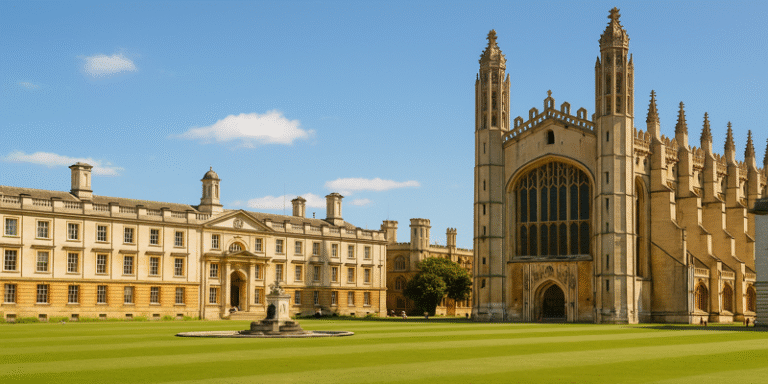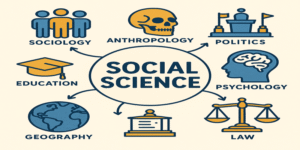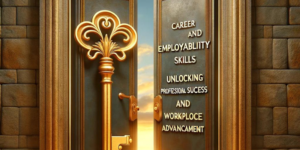The University of Cambridge is one of the most prestigious universities in the world, renowned for its rich academic heritage, pioneering research, and significant global impact. Founded in 1209, Cambridge has been at the forefront of scholarly achievement for over eight centuries. Like its historic counterpart, the University of Oxford, Cambridge combines deep-rooted traditions with a commitment to innovation, producing some of the greatest minds in politics, science, literature, and the arts.
Origins and Historical Development
The origins of Cambridge can be traced to a group of scholars who fled Oxford in 1209 after disputes with local townspeople (Brotton, 2016). Seeking a safe haven, they settled in the small market town of Cambridge, establishing a community of scholars that eventually evolved into a formal university.
The institution received its first royal charter from King Henry III in 1231, granting it official recognition and privileges (Leader, 1988). By the 14th century, Cambridge had developed a reputation for excellence in theology and the liberal arts, attracting students from across Europe.
The Collegiate System
Like Oxford, Cambridge operates a collegiate system, comprising 31 autonomous colleges (University of Cambridge, 2023). The oldest, Peterhouse, was founded in 1284, while the newest, Robinson College, was established in 1977. Each college provides accommodation, dining, pastoral care, and small-group teaching, fostering a close-knit academic community.
The college tutorial or supervision system is at the heart of Cambridge teaching. Undergraduates meet with expert supervisors in small groups to discuss their work, enabling personalised learning and intensive academic support (Ashwin, 2005).
Teaching and Academic Traditions
Cambridge is famous for its rigorous academic environment and emphasis on critical inquiry. Its Tripos system of examinations, established in the 19th century, remains central to undergraduate assessment (Brooke, 2016). The curriculum spans the arts, humanities, social sciences, natural sciences, and engineering.
Ceremonial traditions remain important. Students wear academic dress for formal events, including matriculation, graduation, and formal college dinners. The university also upholds long-standing customs such as the May Bumps rowing races and the Mathematical Tripos challenges, which once shaped Britain’s scientific elite.
Research Excellence and Global Contributions
Cambridge is a leading global research institution, consistently ranked among the top universities worldwide (Times Higher Education, 2023). It has been a hub for transformative scientific discoveries. The Cavendish Laboratory, for example, has produced over 30 Nobel Prize winners in physics, including J.J. Thomson’s discovery of the electron in 1897 and Francis Crick and James Watson’s elucidation of the structure of DNA in 1953 (Judson, 1996).
In medicine, the university played a crucial role in the development of COVID-19 testing technologies and vaccine research collaborations during the pandemic (University of Cambridge, 2021). Its research also drives advancements in artificial intelligence, climate change solutions, and biotechnology.
Libraries and Museums
Cambridge houses one of the greatest library collections in the world. The Cambridge University Library holds over 8 million items, including invaluable medieval manuscripts and early printed books (Cambridge University Library, 2023). The university also boasts world-class museums, such as the Fitzwilliam Museum and the Sedgwick Museum of Earth Sciences, which support both research and public engagement.
Notable Alumni and Influence
Cambridge’s alumni list reads like a who’s who of global achievement. In politics, it has produced figures such as Sir Robert Walpole, Britain’s first Prime Minister, and Jawaharlal Nehru, India’s first Prime Minister. In science, its alumni include Isaac Newton, Charles Darwin, and Stephen Hawking. In literature, Lord Byron, Virginia Woolf, and Sylvia Plath studied at Cambridge.
Cambridge graduates have shaped the arts, sciences, governance, and industry worldwide, reflecting the university’s influence far beyond the UK.
Cultural Heritage and Student Life
Cambridge is a place where academic excellence meets vibrant student culture. Over 500 clubs and societies cater to every interest, from drama and debate to sports and music. The annual May Ball season sees colleges host lavish celebrations marking the end of the academic year.
Rowing is a major tradition, with the Boat Race against Oxford attracting international attention each spring (Dodd, 2012). Music thrives in Cambridge, with college choirs such as King’s College Choir renowned worldwide for their Christmas broadcasts.
Challenges and the Future
Cambridge faces challenges in broadening access and increasing diversity. The university has expanded outreach initiatives and adopted contextual admissions to ensure talented students from disadvantaged backgrounds can gain entry (Boliver, 2015).
Looking ahead, Cambridge is committed to sustainability, pledging to achieve carbon neutrality by 2038. It is also investing heavily in new research facilities, such as the Cambridge Biomedical Campus, to tackle pressing global challenges.
The University of Cambridge stands as a beacon of learning and innovation. From its medieval beginnings to its central role in cutting-edge research, it continues to shape global thought and progress. With a legacy of producing world leaders, Nobel laureates, and creative visionaries, Cambridge remains one of the most influential educational institutions on Earth. Its blend of tradition and forward-thinking research ensures it will remain at the forefront of higher education for generations to come.
References
Ashwin, P. (2005) ‘Variation in students’ experiences of the Oxford and Cambridge tutorial’, Higher Education, 50(4), pp. 631–644. Available at: https://doi.org/10.1007/s10734-004-6369-4. (Accessed: 5 August 2025).
Boliver, V. (2015) ‘Are there distinctive clusters of higher and lower status universities in the UK?’, Oxford Review of Education, 41(5), pp. 608–627. Available at: https://doi.org/10.1080/03054985.2015.1082905. (Accessed: 5 August 2025).
Brooke, C.N.L. (2016) A History of the University of Cambridge: Volume 1. Cambridge: Cambridge University Press.
Brotton, J. (2016) A History of the University of Cambridge. London: Penguin.
Cambridge University Library (2023) About the Library. Available at: https://www.lib.cam.ac.uk/ (Accessed: 5 August 2025).
Dodd, C. (2012) The Story of the Cambridge Boat Races. London: Bloomsbury.
Judson, H.F. (1996) The Eighth Day of Creation: Makers of the Revolution in Biology. New York: Cold Spring Harbor Laboratory Press.
Leader, D.R. (1988) A History of the University of Cambridge: Volume 1. Cambridge: Cambridge University Press.
Times Higher Education (2023) World University Rankings 2023. Available at: https://www.timeshighereducation.com/ (Accessed: 5 August 2025).
University of Cambridge (2021) Cambridge and COVID-19 Research. Available at: https://www.cam.ac.uk/ (Accessed: 5 August 2025).
University of Cambridge (2023) About the University. Available at: https://www.cam.ac.uk/ (Accessed: 5 August 2025).









